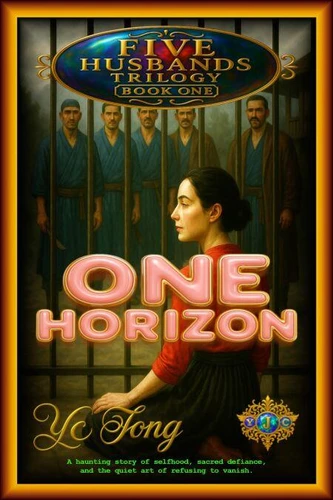One Horizon. Five Husbands, #1
Par :Formats :
Disponible dans votre compte client Decitre ou Furet du Nord dès validation de votre commande. Le format ePub est :
- Compatible avec une lecture sur My Vivlio (smartphone, tablette, ordinateur)
- Compatible avec une lecture sur liseuses Vivlio
- Pour les liseuses autres que Vivlio, vous devez utiliser le logiciel Adobe Digital Edition. Non compatible avec la lecture sur les liseuses Kindle, Remarkable et Sony
 , qui est-ce ?
, qui est-ce ?Notre partenaire de plateforme de lecture numérique où vous retrouverez l'ensemble de vos ebooks gratuitement
Pour en savoir plus sur nos ebooks, consultez notre aide en ligne ici
- FormatePub
- ISBN8231064601
- EAN9798231064601
- Date de parution16/07/2025
- Protection num.pas de protection
- Infos supplémentairesepub
- ÉditeurWalzone Press
Résumé
Anya's life in a remote Himalayan village is a tapestry woven with the threads of an unusual and often challenging tradition: polyandry. Bound to five husbands, the stoic elder brother Tenzin, the controlling middle brother Rinchen, the entitled younger brother Lobsang, the emotionally distant cousin Dawa, and the unsettlingly absent Karma, Anya navigates a complex web of familial duty, emotional isolation, and the quiet erosion of her own identity.
Each husband, in his unique way, exerts a subtle yet profound form of mistreatment, leaving Anya feeling unseen, unheard, and increasingly diminished within the confines of their shared existence. Tenzin's neglect forces Anya to retreat into the solace of her inner world, a private sanctuary where her thoughts and desires can still breathe. Rinchen's rigid control ignites a fierce, albeit hidden, yearning for autonomy, a desperate craving to make her own choices, however small.
Lobsang's arrogant entitlement breeds a simmering resentment, a deep-seated conviction that she deserves more than to be a mere instrument for his gratification. Dawa's emotional unavailability fosters a profound longing for genuine connection, a hunger for someone to see and hear the whispers of her heart truly. And Karma's phantom presence, his near-total absorption in his inner world, creates a chilling sense of invisibility, leaving Anya feeling like a ghost in her own home.
Yet, the cumulative weight of these disparate forms of mistreatment, rather than crushing Anya completely, begins to forge something new within her: a quiet, smoldering defiance. The loneliness, the control, the entitlement, the detachment, and the absence, paradoxically, become the catalysts for a subtle awakening. In the silence of her solitude and the shared burdens of her daily life, Anya begins to recognize that her discontent is not unique.
Through careful observation and veiled inquiries, she perceives the weariness in the eyes of the other women, the forced smiles that mask unspoken frustrations, and the silent language of shared constraint that passes between them during their arduous labor. This nascent awareness of a collective unease becomes a fragile ember of hope in the darkness of Anya's isolation. The whispers of rebellion, once confined to the chambers of her own heart, begin to find echoes in the unspoken sentiments of her community.
A shared glance during the washing of clothes, a carefully worded comment during the intricate weaving, a brief pause that speaks volumes during the harvesting, these subtle interactions confirm that Anya is not alone in her yearning for something more. However, this burgeoning hope is tempered by a deep-seated caution and the very real fear of the consequences of open dissent. The ingrained traditions and the authority of the elders, along with their husbands, cast a long shadow, and the price of disrupting the established order could be severe.
Anya must navigate this treacherous terrain carefully, balancing her growing desire for change with the instinct for self-preservation and the potential risks to the other women who share her silent understanding."The Phantom of Presence" is a poignant exploration of resilience in the face of emotional hardship, the quiet power of female solidarity in a patriarchal society, and the slow, courageous birth of rebellion in the heart of a woman who refuses to be entirely extinguished.
It is a story of finding one's voice in the silence, of seeking connection in isolation, and of the enduring human spirit that yearns for dignity and a life lived authentically, even within the most restrictive of circumstances. Anya's journey is a testament to the fact that even the faintest whispers of discontent can hold the promise of a different dawn.
Each husband, in his unique way, exerts a subtle yet profound form of mistreatment, leaving Anya feeling unseen, unheard, and increasingly diminished within the confines of their shared existence. Tenzin's neglect forces Anya to retreat into the solace of her inner world, a private sanctuary where her thoughts and desires can still breathe. Rinchen's rigid control ignites a fierce, albeit hidden, yearning for autonomy, a desperate craving to make her own choices, however small.
Lobsang's arrogant entitlement breeds a simmering resentment, a deep-seated conviction that she deserves more than to be a mere instrument for his gratification. Dawa's emotional unavailability fosters a profound longing for genuine connection, a hunger for someone to see and hear the whispers of her heart truly. And Karma's phantom presence, his near-total absorption in his inner world, creates a chilling sense of invisibility, leaving Anya feeling like a ghost in her own home.
Yet, the cumulative weight of these disparate forms of mistreatment, rather than crushing Anya completely, begins to forge something new within her: a quiet, smoldering defiance. The loneliness, the control, the entitlement, the detachment, and the absence, paradoxically, become the catalysts for a subtle awakening. In the silence of her solitude and the shared burdens of her daily life, Anya begins to recognize that her discontent is not unique.
Through careful observation and veiled inquiries, she perceives the weariness in the eyes of the other women, the forced smiles that mask unspoken frustrations, and the silent language of shared constraint that passes between them during their arduous labor. This nascent awareness of a collective unease becomes a fragile ember of hope in the darkness of Anya's isolation. The whispers of rebellion, once confined to the chambers of her own heart, begin to find echoes in the unspoken sentiments of her community.
A shared glance during the washing of clothes, a carefully worded comment during the intricate weaving, a brief pause that speaks volumes during the harvesting, these subtle interactions confirm that Anya is not alone in her yearning for something more. However, this burgeoning hope is tempered by a deep-seated caution and the very real fear of the consequences of open dissent. The ingrained traditions and the authority of the elders, along with their husbands, cast a long shadow, and the price of disrupting the established order could be severe.
Anya must navigate this treacherous terrain carefully, balancing her growing desire for change with the instinct for self-preservation and the potential risks to the other women who share her silent understanding."The Phantom of Presence" is a poignant exploration of resilience in the face of emotional hardship, the quiet power of female solidarity in a patriarchal society, and the slow, courageous birth of rebellion in the heart of a woman who refuses to be entirely extinguished.
It is a story of finding one's voice in the silence, of seeking connection in isolation, and of the enduring human spirit that yearns for dignity and a life lived authentically, even within the most restrictive of circumstances. Anya's journey is a testament to the fact that even the faintest whispers of discontent can hold the promise of a different dawn.
Anya's life in a remote Himalayan village is a tapestry woven with the threads of an unusual and often challenging tradition: polyandry. Bound to five husbands, the stoic elder brother Tenzin, the controlling middle brother Rinchen, the entitled younger brother Lobsang, the emotionally distant cousin Dawa, and the unsettlingly absent Karma, Anya navigates a complex web of familial duty, emotional isolation, and the quiet erosion of her own identity.
Each husband, in his unique way, exerts a subtle yet profound form of mistreatment, leaving Anya feeling unseen, unheard, and increasingly diminished within the confines of their shared existence. Tenzin's neglect forces Anya to retreat into the solace of her inner world, a private sanctuary where her thoughts and desires can still breathe. Rinchen's rigid control ignites a fierce, albeit hidden, yearning for autonomy, a desperate craving to make her own choices, however small.
Lobsang's arrogant entitlement breeds a simmering resentment, a deep-seated conviction that she deserves more than to be a mere instrument for his gratification. Dawa's emotional unavailability fosters a profound longing for genuine connection, a hunger for someone to see and hear the whispers of her heart truly. And Karma's phantom presence, his near-total absorption in his inner world, creates a chilling sense of invisibility, leaving Anya feeling like a ghost in her own home.
Yet, the cumulative weight of these disparate forms of mistreatment, rather than crushing Anya completely, begins to forge something new within her: a quiet, smoldering defiance. The loneliness, the control, the entitlement, the detachment, and the absence, paradoxically, become the catalysts for a subtle awakening. In the silence of her solitude and the shared burdens of her daily life, Anya begins to recognize that her discontent is not unique.
Through careful observation and veiled inquiries, she perceives the weariness in the eyes of the other women, the forced smiles that mask unspoken frustrations, and the silent language of shared constraint that passes between them during their arduous labor. This nascent awareness of a collective unease becomes a fragile ember of hope in the darkness of Anya's isolation. The whispers of rebellion, once confined to the chambers of her own heart, begin to find echoes in the unspoken sentiments of her community.
A shared glance during the washing of clothes, a carefully worded comment during the intricate weaving, a brief pause that speaks volumes during the harvesting, these subtle interactions confirm that Anya is not alone in her yearning for something more. However, this burgeoning hope is tempered by a deep-seated caution and the very real fear of the consequences of open dissent. The ingrained traditions and the authority of the elders, along with their husbands, cast a long shadow, and the price of disrupting the established order could be severe.
Anya must navigate this treacherous terrain carefully, balancing her growing desire for change with the instinct for self-preservation and the potential risks to the other women who share her silent understanding."The Phantom of Presence" is a poignant exploration of resilience in the face of emotional hardship, the quiet power of female solidarity in a patriarchal society, and the slow, courageous birth of rebellion in the heart of a woman who refuses to be entirely extinguished.
It is a story of finding one's voice in the silence, of seeking connection in isolation, and of the enduring human spirit that yearns for dignity and a life lived authentically, even within the most restrictive of circumstances. Anya's journey is a testament to the fact that even the faintest whispers of discontent can hold the promise of a different dawn.
Each husband, in his unique way, exerts a subtle yet profound form of mistreatment, leaving Anya feeling unseen, unheard, and increasingly diminished within the confines of their shared existence. Tenzin's neglect forces Anya to retreat into the solace of her inner world, a private sanctuary where her thoughts and desires can still breathe. Rinchen's rigid control ignites a fierce, albeit hidden, yearning for autonomy, a desperate craving to make her own choices, however small.
Lobsang's arrogant entitlement breeds a simmering resentment, a deep-seated conviction that she deserves more than to be a mere instrument for his gratification. Dawa's emotional unavailability fosters a profound longing for genuine connection, a hunger for someone to see and hear the whispers of her heart truly. And Karma's phantom presence, his near-total absorption in his inner world, creates a chilling sense of invisibility, leaving Anya feeling like a ghost in her own home.
Yet, the cumulative weight of these disparate forms of mistreatment, rather than crushing Anya completely, begins to forge something new within her: a quiet, smoldering defiance. The loneliness, the control, the entitlement, the detachment, and the absence, paradoxically, become the catalysts for a subtle awakening. In the silence of her solitude and the shared burdens of her daily life, Anya begins to recognize that her discontent is not unique.
Through careful observation and veiled inquiries, she perceives the weariness in the eyes of the other women, the forced smiles that mask unspoken frustrations, and the silent language of shared constraint that passes between them during their arduous labor. This nascent awareness of a collective unease becomes a fragile ember of hope in the darkness of Anya's isolation. The whispers of rebellion, once confined to the chambers of her own heart, begin to find echoes in the unspoken sentiments of her community.
A shared glance during the washing of clothes, a carefully worded comment during the intricate weaving, a brief pause that speaks volumes during the harvesting, these subtle interactions confirm that Anya is not alone in her yearning for something more. However, this burgeoning hope is tempered by a deep-seated caution and the very real fear of the consequences of open dissent. The ingrained traditions and the authority of the elders, along with their husbands, cast a long shadow, and the price of disrupting the established order could be severe.
Anya must navigate this treacherous terrain carefully, balancing her growing desire for change with the instinct for self-preservation and the potential risks to the other women who share her silent understanding."The Phantom of Presence" is a poignant exploration of resilience in the face of emotional hardship, the quiet power of female solidarity in a patriarchal society, and the slow, courageous birth of rebellion in the heart of a woman who refuses to be entirely extinguished.
It is a story of finding one's voice in the silence, of seeking connection in isolation, and of the enduring human spirit that yearns for dignity and a life lived authentically, even within the most restrictive of circumstances. Anya's journey is a testament to the fact that even the faintest whispers of discontent can hold the promise of a different dawn.












